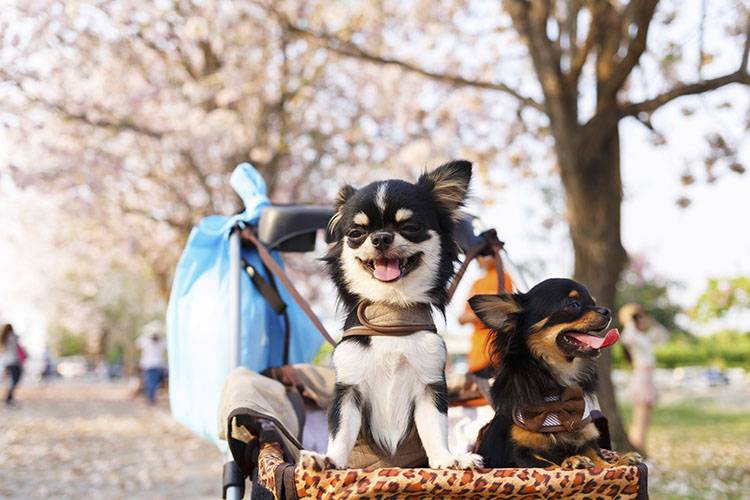Do’s and Don’ts of Treating Dogs Like Humans
It depends. There’s a long, fancy word for treating dogs like humans, and it’s called anthropomorphism. Anthropomorphism is defined as the “attribution of human traits, emotions, and intentions to non-human entities and is considered to be an innate tendency of human psychology” (Oxford Dictionary, 1885).
You’re probably wondering how anthropomorphism applies to you and your dog, which is a fair question. As a professional dog trainer, I have mixed emotions about ascribing human feelings to dogs. I think there are good and bad parts of this puzzle, so let’s discuss whether or not you should treat dogs like humans.
DO: Treat Your Dog Like a Human
Some aspects of anthropomorphism are good. In my opinion, I believe pet owners can relate to pets by attributing certain human characteristics to their puppies and dogs. As pet owners, we watch our fuzzy family member closely. We try interpreting her facial expressions, wagging tail and body positioning to understand her needs. Of course, as pet owners, we tap into the only knowledge we have, which come from our own emotions and body language.
As pet owners, when our dog or puppy whimpers, we run to console her because the sound resembles a small child in need. We want to protect, nurture and love her; it’s normal human behavior. I believe anthropomorphism creates empathy, which I feel is a good thing between pet owners and their precious dogs.
When pet owners dress their dogs in darling little dresses, place barrettes in their hair or push their dogs in baby strollers, this is an example of anthropomorphism. Some pet experts feel treating dogs like human children is taking the behavior a bit too far, but honestly, I don’t have an issue with it. When I see a dog wearing a fabulous polka dot dress or sporting a trendy bandana, I see this as the pet owner loving and caring for his dog intensely, and I feel all dogs deserve this type of love and devotion.
DON’T: Attribute Guilt or Vengefulness to Your Dog
Attributing human feelings and emotions can get a bit tricky in certain circumstances, and pet owners have a difficult time understanding how dogs really think in these situations. Sometimes, a dog’s body language will portray a certain human emotion, but it’s not always what it seems.
Guilt
Guilt is a big one and probably the most challenging part of anthropomorphism toward dogs. This is the truth: dogs don’t feel guilt. I know you could swear on your life your dog was ashamed for chewing your shoe when you showed it to her, but she wasn’t feeling guilt. Instead, she was scared.
When dogs pin their ears back, freeze, walk away, blink quickly, lick their lips, flick their tongues, turn their head sideways and lower their bodies downward, they’re actually reacting to your angry body language. When you’re angry, your dog’s slinking behavior is trying to calm you down. Your dog isn’t guilty; he’s scared. You don’t even have to say a single word to your dog. Just standing still, staring and breathing deeply in front of your dog will cue her that you’re angry. Still don’t believe me? There’s plenty of research proving that dogs don’t feel guilt; and, as a human, I wish I didn’t feel guilt either. 🙂
Dogs don’t feel guilt. They just don’t think that way.
Revenge
Dogs don’t seek revenge. They don’t pee on your bed because you left them alone all day. Your dog didn’t chew, urinate and poop on your favorite shoe because you yelled at her earlier. Dogs aren’t spiteful.
When I explain how this anthropomorphism concept isn’t true during group dog training class, some pet owners will look at each other with confused expressions and then ask, “So why did my dog do that?” Dogs chew on shoes because you left them out, dogs potty on bedding or furniture because they’re scared from being alone all day or hearing thunderstorms, and dogs poop because they’re practicing marking behavior.
I know, you’re probably saying, “But my dog hasn’t chewed my shoes in over a year.” If the right opportunity presents itself, your dog will chew your shoe no matter how long it’s been since the last incident. Personally, I think this is where dog behavior supersedes human behavior, as we all know revenge and spite will eat you alive.
It’s not revenge your dog is after; it’s opportunity. 🙂
What This Means for You and Your Dog
Continue singing your dog little songs, use baby talk to convince her meal times are a good thing, dress her up in a darling dress, love her, nurture her, protect her and cater to all of her needs, but don’t assume she’s guilty or vengeful. Keep anthropomorphism in check, please. 🙂





